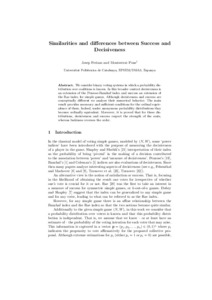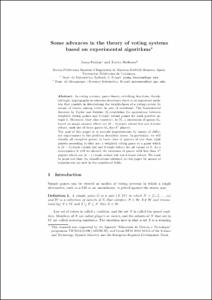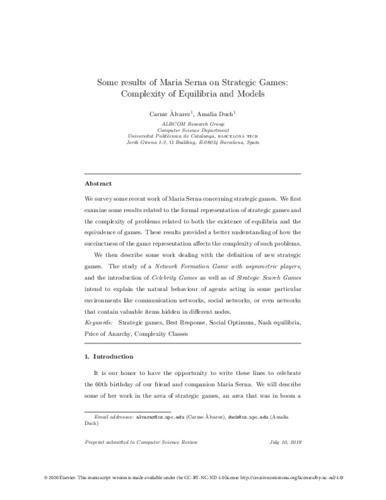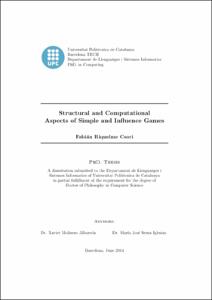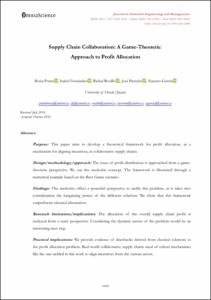Exploració per tema "Jocs, Teoria de"
Ara es mostren els items 197-216 de 242
-
Reconstructing a simple game from a uniparametric family of allocations

(Springer, 2013-10-01)
(Springer, 2013-10-01)
Article
Accés restringit per política de l'editorialSeveral relationships between simple games and a particular type of solu- tions for cooperative games are studied in this paper. These solutions belong to the set of semivalues and they are related to a unique parameter ... -
Recubrimientos k-arco transitivos de digrafos

(Universitat Politècnica de Catalunya, 2001-02-02)
(Universitat Politècnica de Catalunya, 2001-02-02)
Tesi
Accés obertUn digrafo o grafo dirigido se dice que es k-arco transitivo si tiene grupo de automorfismos que actúa transitivamente en el conjunto de k-arcos. Para un entero positivo k, un k-arco de un digrafo es una secuencia ... -
Refining the imprecise meaning of non-determinism in the Web by strategic games

(Springer, 2019)
(Springer, 2019)
Text en actes de congrés
Accés obertNowadays interactions with the World Wide Web are ubiquitous. Users interact through a number of steps consisting of site calls and handling results that can be automatized as orchestrations. Orchestration results have ... -
Scenario-based price negotiations vs. game theory in the optimization of coordinated supply chains

(Elsevier, 2015)
(Elsevier, 2015)
Comunicació de congrés
Accés restringit per política de l'editorialA scenario-based negotiation (SBN) win-to-win approach is proposed for the optimization of coordinated decentralized multi-site multi-product Supply Chains (SCs) in a competitive environment. Based on non-symmetric roles, ... -
Scenario-based price negotiations vs. game theory in the optimization of coordinated supply chains

(2015)
(2015)
Article
Accés restringit per política de l'editorialA scenario-based negotiation (SBN) win-to-win approach is proposed for the optimization of coordinated decentralized multi-site multi-product Supply Chains (SCs) in a competitive environment. Based on non-symmetric roles, ... -
Semivalues: power, potential and multilinear extensions

(2009-04)
(2009-04)
Report de recerca
Accés obertThe notions of power and potential, both defined for any semivalue, give rise to two endomorphisms of the vector space of all cooperative games on a given player set. Several properties of these linear mappings are stated ... -
Separability by semivalues modified for games with coalition structure

(2009-06)
(2009-06)
Article
Accés obertTwo games are inseparable by semivalues if both games obtain the same allocation whatever semivalue is considered. The problem of separability by semivalues reduces to separability from the null game. For four or more ... -
Si és convexa ha de ser simple

(2017-05-03)
(2017-05-03)
Audiovisual
Accés obertEn el context de la teoria dels jocs d’estratègia descriuré un ben conegut concepte de solució anomenat “equilibri correlacionat” (una generalització molt natural de l'equilibri de Nash). A continuació explicaré com els ... -
Similarities and differences between success and decisiveness

(AA Publications, 2014)
(AA Publications, 2014)
Text en actes de congrés
Accés obertWe consider binary voting systems in which a probability distribution over coalitions is known. In this broader context decisiveness is an extension of the Penrose-Banzhaf index and success an extension of the Rae index ... -
Simple games and weighted games: a theoretical and computational viewpoint

(2009-04)
(2009-04)
Article
Accés restringit per política de l'editorial -
Solving Becker's assortative assignments and extensions

(Academic Press, 2018-09-19)
(Academic Press, 2018-09-19)
Article
Accés obertWe analyze assortative assignment games, introduced in Becker (1973) and Eriksson et al. (2000). We study the extreme core points and show an easy way to compute them. We find a natural solution for these games. It coincides ... -
Some advances in the theory of voting systems based on experimental algorithms

(2006-01)
(2006-01)
Report de recerca
Accés obertIn voting systems, game theory, switching functions, threshold logic, hypergraphs or coherent structures there is an important problem that consists in determining the weightedness of a voting system by means of trades ... -
Some results of Maria Serna on strategic games: Complexity of equilibria and models

(Elsevier, 2021-02)
(Elsevier, 2021-02)
Article
Accés obertWe survey some recent work of Maria Serna concerning strategic games. We first examine some results related to the formal representation of strategic games and the complexity of problems related to both the existence of ... -
Sortis in ludis: Euler, juegos y paradojas

(2007-02-14)
(2007-02-14)
Audiovisual
Accés obertEuler atacó problemas de probabilidad y estadística en varias ocasiones. Una de las más interesantes es el trabajo “Vera estimatio sortis in ludis” (La correcta evaluación del riesgo en un juego), publicado póstumamente y ... -
Star-shaped mediation in influence games

(2013)
(2013)
Comunicació de congrés
Accés obertWe are interested in analyzing the properties of multi-agent systems [13] where a set of agents have to take a decision among two possible alternatives with the help of the social environment or network of the system itself. ... -
Strategic network formation with attacks and immunization: dynamics

(Universitat Politècnica de Catalunya, 2021-06-29)
(Universitat Politècnica de Catalunya, 2021-06-29)
Treball Final de Grau
Accés obertIn this project we study the dynamic behaviour of Strategic Network Formation Games with attacks and immunization introduced by Goyal et al., 2016. This model takes Reachability Network Formation Games introduced by Bala ... -
Stressed web environments as strategic games: risk profiles and Weltanschauung

(Publicació Electrònica en CD-ROM, 2010)
(Publicació Electrònica en CD-ROM, 2010)
Text en actes de congrés
Accés obertWe consider the behaviour of a set of services in a stressed web environment where performance patterns may be di cult to pre- dict. In stressed environments the performances of some providers may degrade while the ... -
Structural and computational aspects of simple and influence games

(Universitat Politècnica de Catalunya, 2014-07-29)
(Universitat Politècnica de Catalunya, 2014-07-29)
Tesi
Accés obertSimple games are a fundamental class of cooperative games. They have a huge relevance in several areas of computer science, social sciences and discrete applied mathematics. The algorithmic and computational complexity ... -
Success and decisiveness on proper symmetric games


(2015-12)
(2015-12)
Article
Accés obertThis paper provides a complete study for the possible rankings of success and decisiveness for individuals in symmetric voting systems, assuming anonymous and independent probability distributions. It is proved that for ... -
Supply Chain Collaboration: A Game-Theoretic Approach to Profit Allocation

(OmniaScience, 2016-12)
(OmniaScience, 2016-12)
Article
Accés obertPurpose: This paper aims to develop a theoretical framework for profit allocation, as a mechanism for aligning incentives, in collaborative supply chains. Design/methodology/approach: The issue of profit distribution is ...







